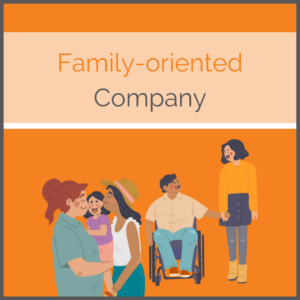
At tracekey, it is important that our employees organize their lives outside of work well. Especially for those who take care of children or other relatives, we want to offer support. With recognition and flexibility, we help our employees balance their professional and private commitments.
Compatibility is a big issue. Skilled labor shortages, high living costs, and problems in daycare centers and schools burden caregivers. Companies that recognize these challenges and value parents and other caregivers are therefore a real asset. Studies also show that parenthood enhances skills: organizational and cooperation skills, stress resistance, and communication strength are among the soft skills desired in almost all job postings. Parents automatically enhance their skills in these areas as soon as they start managing a family.
Stefan Hoffmann, Managing Director at tracekey: “Many employers still see caregiving and parenthood as problematic and ignore this part of their employees’ reality. We believe that work and private life are not completely separable and that there are always interactions. That’s why we tackle this challenge together with our employees and take their needs into account in our daily work.”
Baby boom as proof of team resilience
At tracekey, half of the employees are parents. Most of them have children under 18 years old, and a third of them have one or more children under three years old. The tracekey baby boom a few years ago, when seven of our employees became parents (again) within just 16 months, was a challenge. Seven times parental leave, finding childcare places, and first winters with illness-related absences among caregivers, children, and parents. Seven times the question: How do we handle team capacities? Do we need more staff? Where can we bridge gaps, which skills need to be replaced, long-term or only temporarily?
Stefan Hoffmann: “We are firmly behind the idea that parental leave is very important for parents and children. That’s why we actively promote equality and foster a culture where all parents are equally supported. However, we also have a rather classic distribution of parental leave months. Mothers, on average, take significantly longer parental leave than fathers. We see the structural reasons for this. That’s why it’s important to us that no one experiences disadvantages due to childcare. Neither through reduced hours nor through taking parental leave.”
Not all those who were part of the baby boom have returned to work yet, and others have already gone on parental leave again. The baby wave has shown the teams how well they can handle absences through organization and prioritization. And of course, how nice it is when colleagues return and bring new insights and skills from the intensive time of becoming parents.
Stefan Hoffmann: “I have children under 18 myself. So, I know how cancelled childcare arrangements, illness, and everyday life with children can repeatedly present great challenges. That’s why I understand the situation many of our employees are in. It’s part of life and part of our shared workday.”
Family-oriented working methods at tracekey
Tracekey is well-positioned for a family-oriented work culture through organizational structures and agile working. In addition to recognizing the multiple burdens of team members who perform care work, there are also very practical factors that make tracekey a family-friendly employer:
- Flexibility in choosing the workplace: in the office, at home, in the EU abroad, no office quota, spontaneous home office possible
- Consideration of individual time structures whenever possible and necessary: our standard meetings take place in the morning. This benefits part-time employees, working students, and parents who need more flexibility in the afternoon.
- We discuss together how things will continue after parental leave. For example, we enable a gentle start with a gradual increase in hours. Or the (temporary) reduction of hours when necessary.
- Part-time work has no impact on the appreciation of the work performed. Taking on responsibility and further development are possible and desired in every role with all hour contingents.
A family-oriented work culture not only has a positive impact on caregivers but also on all other employees. For example, part-time employees who, for various reasons, do not work 40 hours benefit, as do full-time employees who appreciate more flexibility and the recognition of different life situations. At tracekey, people work part-time in all teams and in very different roles. And it works very well, whether in support, marketing, HR, or development.